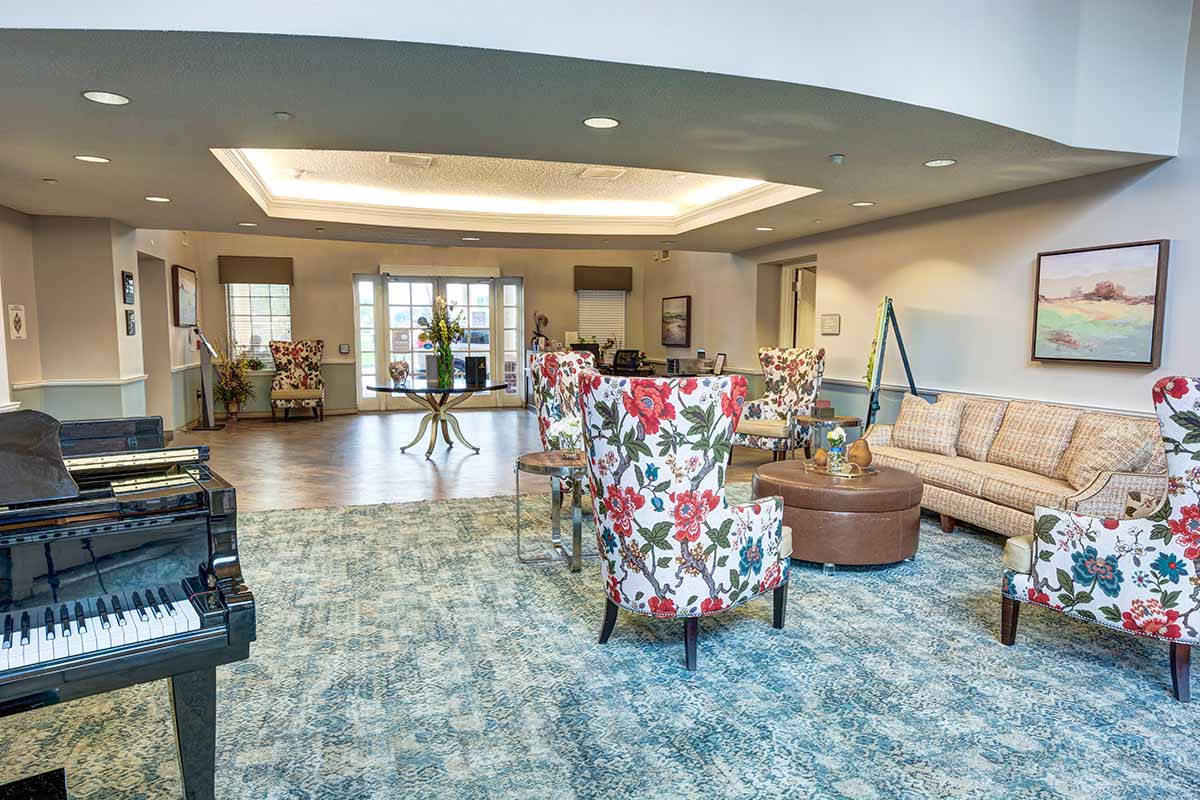Find Small Memory Carehomes Charlotte Families Trust
Wiki Article
All Concerning Memory Care Services: Why Tiny Memory Care Homes Are a Wonderful Selection
Memory treatment solutions play a necessary function in supporting individuals with Alzheimer's and dementia. Little memory treatment homes stand out for their customized strategy and intimate setup. With reduced staff-to-resident proportions, these homes promote stronger connections and customized treatment. Locals profit from improved social interactions and a safe setting. As households explore alternatives, comprehending the unique benefits of little memory care homes ends up being vital. What variables should be taken into consideration when choosing the right home?Recognizing Memory Care Provider
While lots of may be acquainted with basic elderly care alternatives, understanding memory treatment services is essential for families facing the obstacles of cognitive decline. Memory treatment particularly satisfies people with conditions such as Alzheimer's illness and other kinds of mental deterioration. These services give a structured atmosphere that concentrates on improving the lifestyle for homeowners through specialized care and support.Memory care centers are developed to assure safety and security, usually including safeguarded environments to stop wandering. Educated employee are readily available around the clock to assist with daily activities, medicine monitoring, and personal care. Additionally, memory care programs usually consist of cognitive stimulation activities, customized to engage citizens and advertise mental wellness. Family members can take advantage of understanding these solutions, as they enable notified choices concerning their liked ones' care, guaranteeing that their certain requirements and preferences are resolved in a supportive and thoughtful way.The Benefits of Tiny Memory Treatment Residences
Tiny memory care homes provide distinct advantages that can greatly improve the lifestyle for citizens with cognitive disabilities. One considerable advantage is the intimate setting, which enables tailored communications among personnel and citizens. This smaller setup cultivates significant connections, minimizing feelings of isolation and anxiety usually experienced by individuals with memory issues.Additionally, the reduced staff-to-resident proportion in little memory care homes allows caregivers to give more alert guidance and support. This approach not just boosts safety yet likewise promotes a complacency for the residents.Moreover, little memory care homes can adjust rapidly to the special needs and preferences of each homeowner, permitting a more homey environment. Such an environment can motivate social involvement and engagement in activities, inevitably enhancing the everyday experiences of those living with cognitive disabilities.Personalized Treatment Plans for Locals
Personalized care strategies are vital in memory treatment homes, as they satisfy the distinct needs and preferences of each resident. These plans begin with extensive analyses conducted by competent professionals, that evaluate cognitive capacities, clinical background, and individual rate of interests. This tailored technique assurances that care is not just effective however additionally respectful of each person's self-respect and autonomy.Moreover, personalized treatment strategies are versatile, permitting adjustments as citizens' demands progress in time. This versatility cultivates a feeling of security and knowledge, which is vital for people coping with memory difficulties. Caretakers are trained to implement these plans constantly, supplying support that lines up with the citizens' regimens and preferences.Ultimately, individualized treatment strategies boost the quality of life for locals by advertising health, freedom, and involvement, making them a basic aspect of memory treatment solutions in small memory care homes.Creating a Home-Like Atmosphere
Producing a home-like environment is important for fostering comfort and knowledge in memory care setups, as it considerably affects locals' emotional health. Tiny memory treatment homes frequently focus on individualized touches, such as warm shade palettes, family members pictures, and acquainted furnishings arrangements, which aid homeowners feel extra at simplicity. Incorporating aspects reminiscent of a conventional home, like comfortable living areas and public areas, encourages a feeling of belonging.Moreover, making use of natural light and exterior areas can boost the ambience, promoting relaxation and tranquility. Team participants play a considerable role in preserving this setting by engaging with residents in a thoughtful way, treating them like family. Routine tasks, such as cooking or horticulture, can also add to a home-like feeling, offering possibilities for locals to join meaningful experiences. Generally, producing a nurturing setting supports cognitive feature and psychological stability, making it a vital facet of memory care services.
Boosted Social Communication and Community
Improved social communication and neighborhood are essential components of memory care services. By fostering individualized social involvement and developing a family-like ambience, these services advertise meaningful connections among homeowners. Team events and activities even more motivate engagement, helping individuals really feel more included and sustained.Individualized Social Interaction
While social interaction is necessary for total wellness, many people with memory disabilities commonly struggle to engage meaningfully with others. Customized social interaction in memory care homes addresses this obstacle by creating tailored tasks that accommodate residents' distinct passions and capabilities. By concentrating on individual choices, caregivers can promote connections that reverberate deeply with each person. Activities such as art therapy, music sessions, and guided discussions advertise cognitive excitement and psychological expression. Furthermore, tiny team settings urge sociability and enable even more intimate interactions, boosting sensations of belonging. This approach not only combats sensations of isolation yet likewise empowers locals to maintain a feeling of identity, ultimately adding to boosted mental health and wellness and quality of life.Family-like Ambience
In a memory care setup, promoting a family-like ambience greatly improves social communication and builds a feeling of community amongst locals. Smaller memory treatment homes commonly prioritize intimate atmospheres, enabling locals to create closer connections with each other and personnel participants. This nurturing ambience promotes trust fund, which is vital for people with memory problems. Locals are most likely to talk and share experiences, producing an encouraging network that eases feelings of solitude. The experience of shared rooms and regimens contributes to a sense of belonging, additionally urging social interaction (personalized memory care). In such settings, emotional bonds flourish, causing enhanced total wellness and a greater top quality of life for homeowners as they browse their daily experiences togetherTeam Activities and Events

Safety And Security and Safety Attributes in Little Homes
Lots of tiny homes made for memory treatment include vital safety and security and security features to guarantee the well-being of homeowners. These homes usually make use of safe entrance and exit indicate avoid wandering, an usual worry among people with memory disabilities. Additionally, monitoring systems and alarm system systems improve surveillance, making certain that personnel can promptly react to any unusual activities.Interior formats are tailored for safety and security, with lessened hazards such as sharp edges and clutter-free pathways. Handrails and non-slip floor covering are usually mounted to minimize the risk of falls. Team member are learnt emergency methods, guaranteeing they are gotten ready for different situations.Moreover, individualized care strategies might consist of analysis of individual safety needs, providing customized remedies for every resident. In general, these safety and protection features produce a nurturing atmosphere where citizens can thrive while maintaining their dignity and freedom.How to Choose the Right Memory Care Home
How can families ensure they select one of the most appropriate memory care home for their liked ones? The decision needs careful factor to consider of several variables. Initially, families must assess the facility's team qualifications and training, guaranteeing that caretakers are experienced in handling memory-related problems. Next off, it's essential to assess the home's atmosphere, concentrating on security attributes and whether it cultivates a sense of community and belonging. Visiting the center can give insight right into daily activities and the social environment, which are crucial for mental excitement and psychological health. Furthermore, families must ask about the treatment plans provided, guaranteeing they are customized to private demands. Ultimately, considering the home's place and access for family members sees can contribute to a smoother change. By addressing these elements, households can make an informed decision that prioritizes their loved one's convenience and high quality of life in a memory treatment setup.Regularly Asked Inquiries
What Qualifications Should Staff Members in Memory Treatment Homes Have?
Team member in memory care homes should have appropriate accreditations, experience in dementia care, solid interaction skills, and compassion. Ongoing training in behavior administration and therapeutic interventions boosts their capability to sustain locals successfully.Exactly How Do Memory Treatment Solutions Differ From Typical Assisted Living?
Memory care solutions concentrate particularly on individuals with memory impairments, providing customized support and structured atmospheres. On the other hand, conventional assisted living supplies general aid with day-to-day activities, lacking the customized approach needed for those with cognitive obstacles.What Kinds of Tasks Are Supplied in Memory Treatment Houses?
Memory treatment homes normally use a variety of activities designed to engage citizens. Usual alternatives include art treatment, songs sessions, cognitive games, physical workouts, horticulture, and social occasions, all focused on enhancing wellness and cognitive feature.Can Residents Bring Their Own Belongings to Memory Care Residences?
Residents can generally bring their own possessions to memory care homes, allowing them to personalize their living room - personalized memory care. This technique helps develop an acquainted setting, advertising convenience and a sense of identification for the peoplevisite site

Exactly How Are Family Members Entailed in the Treatment Process?
Household participants play an essential role in the care process, frequently taking part in decision-making, going to treatment meetings, and offering emotional support. Their involvement promotes a collective environment, enhancing the homeowner's general well-being and quality of life. While numerous might be acquainted with basic elderly care alternatives, comprehending memory care solutions is essential for families encountering the obstacles of cognitive decrease. These services provide an organized setting that concentrates on enhancing the high quality of life for residents with specialized care and support.Memory care facilities are made to assure safety and security and safety, frequently including safeguarded atmospheres to avoid roaming. Customized treatment plans are vital in memory treatment homes, as they cater to the one-of-a-kind demands and preferences of each resident. Team members in memory treatment this homes need to possess relevant accreditations, experience in mental deterioration care, strong communication abilities, and compassion. Memory treatment services focus especially on individuals with memory impairments, giving specific assistance and structured atmospheres.Report this wiki page